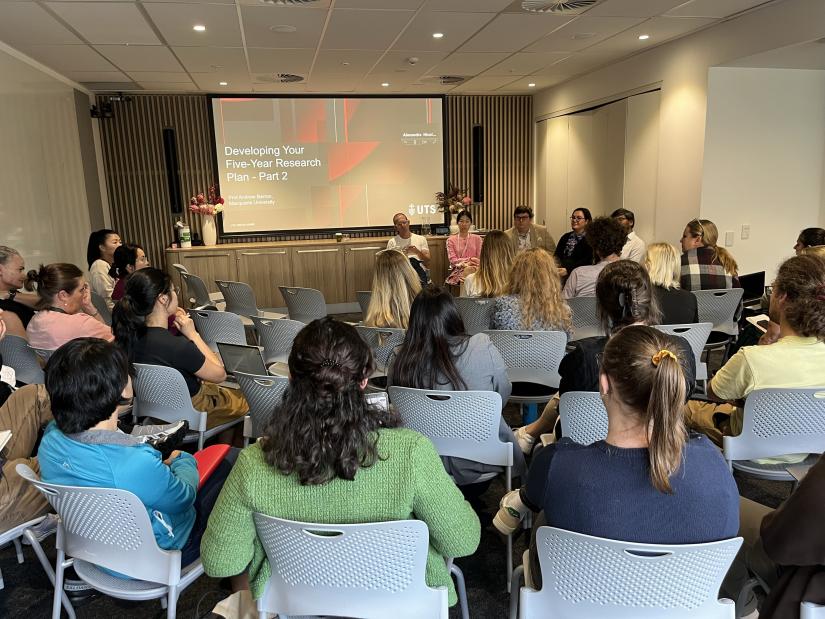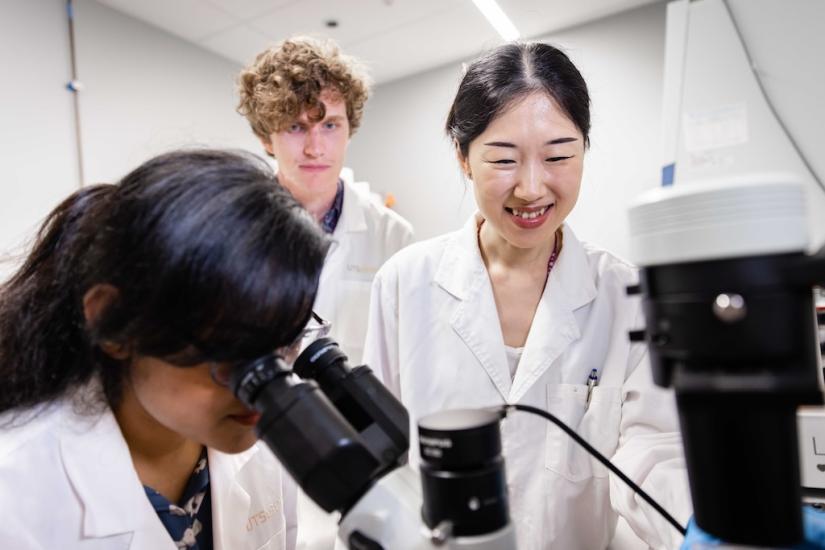In the second session of the Developing your Five-Year Research Plan series, Prof Andrew Barron was joined by Dr Jiao Jiao Li, A/Prof Nic Surawski, Dr Bahareh Berenjforoush Azar and Dr Avinash Singh.
Developing your 5-year research plan

The session opened with the panellists sharing their personal reflections on the research plan.
Avinash from the School of Computer Science spoke about how he has become a senior lecturer since his planning, which is a reflection in itself of its success.
“The most important thing I learned from doing the five-year research plan is that there’s a lot of things that are difficult to decide when making your plan because your career trajectory itself is not clear,” he said.
“But it’s important to keep positive that things are moving as you expected and following your plan as much as possible.” He also pointed out that he focused on short-term goals.
Bahareh from FEIT School of Professional Practice and Leadership discussed her unique experience coming from an energy background and moving to a different discipline in her new role and how the plan helped her navigate that complexity.
She said, “The five-year research plan helped me to make it clear and transparent where I am heading with my background while at the same time being aligned with the school I am currently in.”
Nic from the School of Civil and Environmental Engineering reflected, “Fortune follows the prepared mind.”
Nic shared that he is 2 ½ years through the planning process and has hit his targets including getting a fellowship, a research award, and a promotion.
“That’s what I wanted to achieve by the end of the five-year window so the time investment is worth it,” he said.
Fortune follows the prepared mind.
JJ shared her two main reflections from doing her five-year plan during maternity leave. “The first one was that doing the five-year plan during this period of interruption really helped me crystallise who I wanted to be in five years from a research perspective.”
JJ said it was helpful for her to think about what milestones she needed to reach to be able to get to that point.
“My other reflection is your five year vision doesn’t have to be just centred around research. Think about what your life is outside of research,” she said. “For me I’m really passionate about the equity and diversity space so I allocated part of my time to that.”
It’s about how you see yourself as a whole and how you want others to perceive you in five years. That really helped me crystallise and prioritise tasks and opportunities.
“It’s about how you see yourself as a whole and how you want others to perceive you in five years. That really helped me crystallise and prioritise tasks and opportunities that I decided to pick up or not.”
Andrew said, “One of the mistakes I made before planning was I put things off,” warning that you need to block things off in your calendar.
Mentorship and collaboration
JJ identified the importance of having a variety of mentors from different areas and finding mentors that will help you along the five-year process, “Identify different types of mentors that tick different boxes.”
Talk to your supervisors. Let them know what you are planning and how they can help you along in that process.
JJ also mentioned the value of building relationships with collaborators and how applying for and winning prizes and grants proves your track record for future collaborators to want to work with you.
“Talk to your supervisors. Let them know what you are planning and how they can help you along in that process,” she said. “If they know what your priorities and goals are they can line you up with opportunities.”
Managing disappointment

The panel shared strategies for managing disappointment when research plans do not succeed. They emphasised the importance of feedback and persistence.
JJ shared her experience that led her to winning a Eureka prize in 2024. “I wanted to be known as someone who has good ideas and is trying to push the boundaries of my field, which was difficult to prove.”
“If you asked me five years ago if I would apply for a Eureka prize, I would say I would never be in a position to apply for that.”
JJ shared how she applied for other things and smaller prizes, winning Superstars of STEM and the Tall Poppy Award. She kept applying and kept trying for different things and after winning the Metcalf Award for Stem Cell Research she felt ready to apply for Eureka.
She spoke about building up from smaller awards you prove your track record for future awards.
I’m not starting from scratch because I have already built up the story from my previous grants. I’m not starting from zero. That’s the value of applying for everything.
Bahareh added the value of starting with applying for small grants and going for more and more, “It gives you trust from collaborators for next time you apply for a grant and take small steps to start.”
Nic said, “In the context of the five year plan, be prepared to play the long game.”
JJ identified the importance of visibility, adding that even if you are unsuccessful in applications people will see you and remember you in future rounds.
Bahareh said, “I’m not starting from scratch when I apply for a grant because I have already built up the story from my previous grants. I’m not starting from zero. That’s the value of applying for everything.”
JJ spoke about managing disappointment after being unsuccessful in an application for an award or grant, “I take it as an opportunity to do something I wouldn’t normally do and apply for something different, take a moonshot somewhere else and see if it lands.”
“We build up a repository of failed and successful applications and every subsequent application becomes easier,” she said. “It’s about turning the opportunity into something good for yourself.”
I believe feedback is a key to resolve that disappointment.
The panel also talked about the value of feedback and implementing feedback after not having success.
“I believe feedback is a key to resolve that disappointment,” Avinash said. “Be open to learn from disappointment and build on that.”
Balancing workload
Nic said, “We’ve got finite time and energy and it’s difficult to carve out time to plan.”
“I’ve found that once you get everything into that yearly planner, it is possible to get some more granular level detail,” he added.
“If you don’t know where to start, do what you can do. Put in the fixed commitments – your teaching responsibilities, your service obligations, time for collaboration with colleagues,” he said. “Then you are left with all that stuff you’ve got to do with research. That worked for me.”
I’ve found that once you get everything into that yearly planner, it is possible to get some more granular level detail.
Nic also pointed out, “You’ve got to send a message to your colleagues and the institution that this is my time to build my research and grow my profile.”
JJ shared, “I’ve now got a young family, and you get all sorts of great opportunities thrown at you that look great to pick up. But you have to think – do they actually align with your five-year vision?”
“That’s one of the ways I used to filter whether an opportunity directly aligned with where I saw myself,” she said.
The planning actually saved me when my time and energy budget was compressed. All I could afford to do was the highest priority and that was enough to keep me on track.
“It’s about not letting myself get overcommitted and being really discriminatory about what’s a good opportunity,” Andrew added. “The filtering means you can actually get things done.”
Andrew talked about how commitments can change with big and unexpected life changes and how planning helps you adapt to changing priorities. “The planning actually saved me when my time and energy budget was compressed. All I could afford to do was the highest priority and that was enough to keep me on track.”
Avinash added that the KPI guidelines in every faculty have been helpful for him to constrain his goal in a way that is more realistic.
“The good thing about the plan is it lets you manage the metrics and manage the expectation,” Andrew said.
Attend the final session
Catch up on the first two sessions of Developing your Five-Year Research Plan and attend the final session later this year.
- Watch Developing your Five-Year Research Plan: Part 1 recording.
- Watch Developing your Five-Year Research Plan: Part 2 recording.
Follow UTS Aspire on Humanitix and visit our Events and Workshops page to find out when the next session is and to keep up to date with future events.